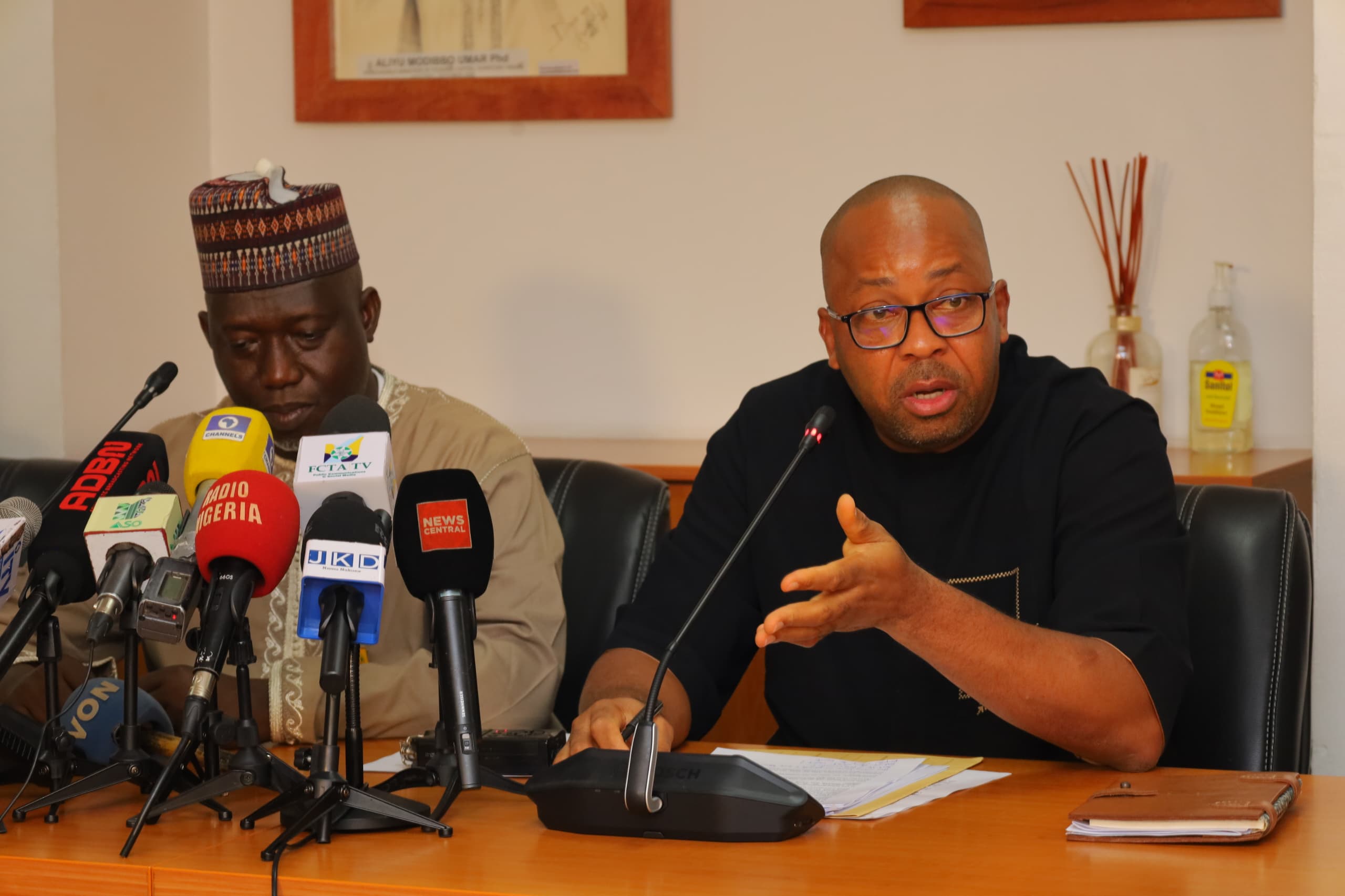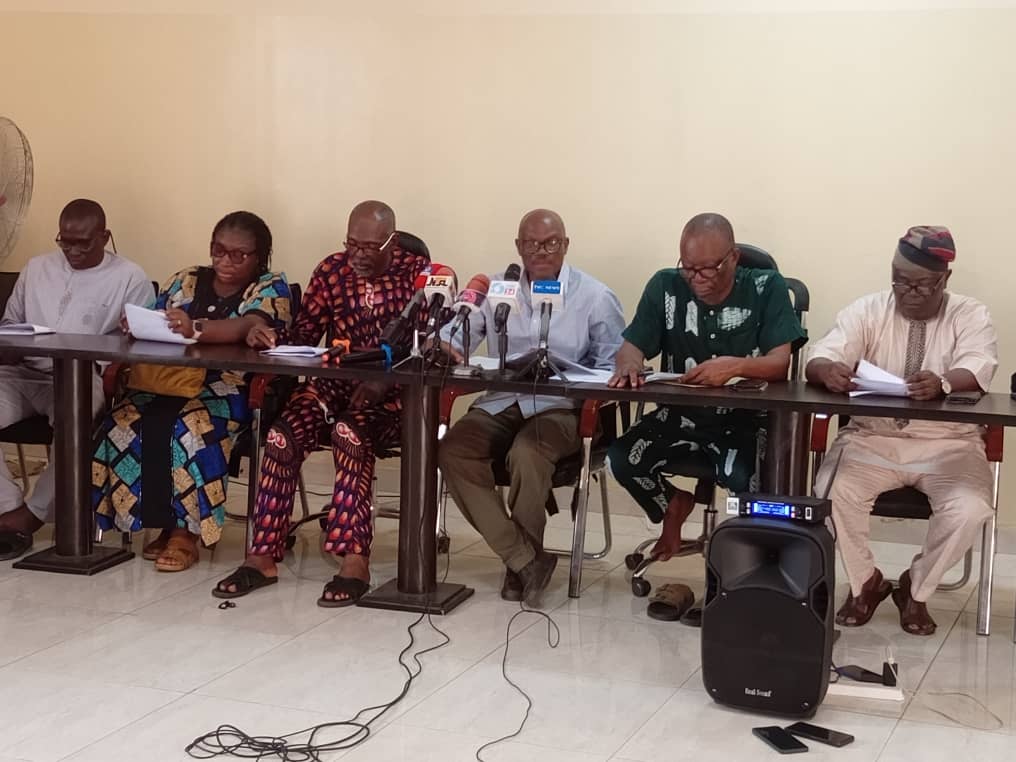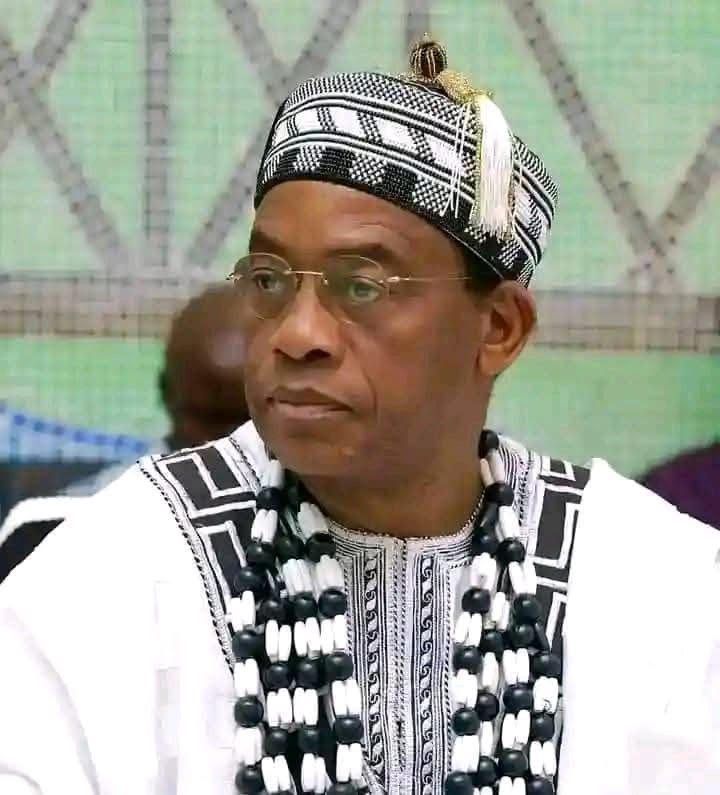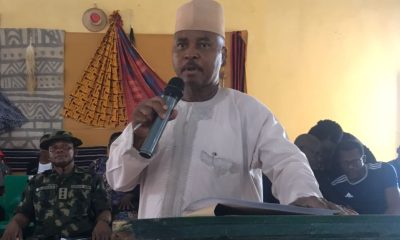NEWS
Nigeria: The Making of a Judicial Selectorate
By Chidi Anselm Odinkalu
Anambra North senatorial constituency comprises seven Local Government Areas (LGAs). These are: Anambra East, Anambra West, Anyamelum, Ogbaru, Onitsha North, Onitsha South, and Oyi. The contest to represent it in the election to the Senate in 2007 turned out to be memorable for all the wrong reasons.
Voting in the election occurred on 28 April 2007. At the end of the contest, the Independent National Electoral Commission (INEC), returned Joy Emordi, the incumbent senator and candidate of the ruling Peoples’ Democratic Party (PDP), as the winner. In the race for the party ticket which preceded the election, Senator Emordi beat out the challenge of a little-known member of the House of Representatives, Ubanese Alphonsus Igbeke. Having lost the contest for the party ticket, however, Ubanese promptly defected to the opposition All Nigeria Peoples Party (ANPP), which granted him the ticket to fly its flag in the contest for the election to the senate in Anambra North.Following the announcement of the election results by the INEC, five of the losing candidates headed to the election petition tribunal to challenge the announcement of Senator Emordi as winner. They included Jessie Balonwu of the Labour Party, and Ubanese of the ANPP. An essential complaint was that there was no lawful voting in Anyamelum and Onitsha South LGAs. If their complaint was upheld, the logic would have necessitated a re-run.Over one year after the conclusion of the election, on 14 June 2008, the tribunal dismissed the petitions, and affirmed Joy Emordi as duly elected. The losing candidates appealed.Jessie Balonwu’s appeal was the first to be decided. On 10 February 2009, a Court of Appeal panel comprising three Justices of Appeal – Victor Omage, Ladan Tsamiya and Olukayode Ariwoola – found that there was no evidence in support of the claim that there were no elections in the two LGAs. The Court of Appeal, therefore, affirmed the decision of the Election Petition tribunal. At the time, appeals concerning elections to the senate ended in the Court of Appeal.Like the other losing candidates, Ubanese lost his case at the election petition tribunal. Like them, he also appealed. Nearly three years after the election, on 24 March 2010, another panel of the Court of Appeal, this time comprising Amiru Sanusi (who was not on the earlier panel) as well as Ladam Tsamiya and Olukayode Ariwoola – both of whom had decided Jessie Balonwu’s case nearly a year earlier – nullified the election of Joy Emordi, declared Ubanese the winner of the election and ordered INEC to issue a certificate in his favour affirming his victory.Six years after that judgment, the National Judicial Council (NJC), sacked Ladan Tsamiya as a judge in connection with judicial corruption in another election case from neighbouring Abia State.Returning to the Anambra North senatorial contest from 2007, Senator Emordi applied to the Supreme Court for a review of the two ostensibly conflicting decisions of the Court of Appeal but the court struck out her case, holding that it did not have jurisdiction to hear her. With one year left to run on the tenure and armed with the judgment of the Court of Appeal, Ubanese ousted Joy Emordi from the Senate in May 2010 to become the Senator for Anambra North. Once there, he promptly defected back to the ruling PDP from the ranks of the ANPP.That was not the first time that Ubanese would be returned as legislator by the votes of judges alone. His first tour of duty as a legislator in the House of Representatives in 2003 was made possible also by highly priced judicial votes.He was not the only one to be selected in this manner in 2003. In the contest for the Anambra South seat for the Senate, the Court of Appeal in Enugu manufactured victory for Ugochukwu Uba – who was not a candidate in the election – after two of the three Justices of Appeal collected humongous bribes to rule in his favour against the candidate who was actually elected. Ugochukwu Uba’s younger brother, Andy, was a very influential presidential confidante at the time.2010 was not the last time that Ubanese’s entire electorate would comprise exclusively of members of the Nigerian judiciary. ThisDay newspaper famously described him as “the serial senator who never wins an election.”In 2011, another high court in Abuja also issued an order requiring the INEC to return Ubanese yet again as Senator for Anambra North after the election had been concluded and a winner declared. The order was stupefying because only an election petition tribunal could issue it.This time, the Attorney-General of the Federation had Ubanese arraigned before the Federal High Court in Abuja on charges of forging and altering the outcome of the party primaries that he lost, misrepresenting to the High Court in Abuja that he had in fact emerged as the winner.Ubanese was ultimately unsuccessful in returning to the Senate in 2011 but had pioneered an electoral business model that would prove both lucrative for all involved and resilient beyond his wildest imagining.Ubanese showed judges how a joint enterprise with politicians could prove effective in making both sides influential, wealthy and powerful while at the same time sidelining the voters from the constitutive enterprise of deciding who controls their destinies. This guarantees that elections no longer end in the polling units. Instead, what we call elections only pare down the candidates who are required thereafter to proceed to court units, where the ultimate selection is determined by judges who alone have the right to vote. The cost of entry into this stage is prohibitive. Only the truly moneyed dare to show up.The constitution may have anointed the people as the electorate but, in Nigeria, the winners and losers in elections are now decided by a judicial selectorate who do not feel themselves beholden to anything that the constitutional electorate may wish, seek, or say.According to a former national vice-chairman of the ruling All Progressives Congress (APC), Salihu Lukman, “citizens can vote but winners are decided in the courtroom by conclaves of judges.” Former president, Goodluck Jonathan, acknowledged in Asaba, capital of Delta State in June 2024 that Nigerian judges increasingly “declare who doesn’t win the election that they are winners.”Selectorate Theory explains how elites access and retain power. It distinguishes between three categories of actors for this purpose. Interchangeables notionally have a role but hardly fit the part. Influentials sometimes may do so. But the focus is on a small category of “Essentials” who decide nearly everything. The clever power seeker focuses on doing a deal with the Essentials at the expense of the Influentials and the Interchangeables.In Nigeria, the judges have made themselves the indispensable Essentials in winning power and retaining it. The people have become very expendable Interchangeables. The national exchequer, meant for the people, now goes to financing the fancies of these electoral Essentials in order to protect the joint enterprise with the politicians. This is all done under ruse of law which, it is claimed, is indispensable to democracy.The “ownership” of judicial figures has thus become an essential political accessory in Nigeria. Every ambitious politician knows that they need to own some judges or at least one. This political business model is a deeply Nigerian variant on Selectorate Theory which is now taking firm root across Africa. For this export, we must thank Ubanese Igbeke and the Uba brothers of Uga in Anambra State. This week, publishers Narrative Landscape will be releasing, The Selectorate, my book which tells the story of how Nigerian judges toppled the people. It is a story that has been long in the making.Chidi Anselm Odinkalu, a lawyer, teaches at the Fletcher School of Law and Diplomacy and can be reached through chidi.odinkalu@tufts.edu.NEWS
Land Revocation: FCTA commences takeover of 4,794 properties in Abuja

By Laide Akinboade, Abuja
4,794 properties revoked over non-payment of Ground Rent, for between 10 and 43 years.
Due to failure of property owners in payment of ground rent on 4,794 properties revoked over non-payment of Ground Rent, for between 10 and 43 years, the Federal Capital Territory Administration (FCTA), at the weekend said, from Monday, 26th May, 2025, it will start taking possession of the properties.
Director of Land Administration for the Federal Capital Territory (FCT) is Chijioke Nwankwoeze, Director Development Control, Muktar Galadima and Minister’s Senior Special Assistant on Public Communications and Social Media, Lere Olayinka,
stated this in Abuja.
Nwankwoeze said N6,967,980,119 was being owed as Ground Rent by 8,375 property owners, as of March this year.
They said; “ownership of the revoked 4,794 properties in the Central Area, Garki I and II, Wuse I and II, Asokoro, Maitama and Guzape districts, had already reverted to the FCTA, and as from Monday, next week, the government will begin to exercise its rights of ownership on the affected landed properties.
“As usual, this will be done without consideration as to ownership of the affected landed properties. It will be purely in line with extant laws and regulations guiding the process.”
The Director of Development Control, explained that affected properties will be sealed up and access to them restricted as from Monday. He said the FCTA will decide what to do with the affected properties in due course.
On the claim that some people went to court, the Director of Lands stated that there was no court decision on the revocation, and as such, the FCTA is not restricted in the discharge of its lawful functions on the affected properties.
Chijioke Nwankwoeze also disclosed that the FCTA was already compiling records of compliance and non-compliance of title holders that were in default of payment of Ground Rent for between one and ten years, who were given a grace of 21 Days to pay up.
He said the government will act accordingly as soon as the records are fully complied and analyzed.
Olayinka said “Recall that on March 18, 2025, we informed you of the revocation of 4,794 land titles in the Central Area, Garki I and II, Wuse I and II, Asokoro, Maitama and Guzape districts.
“These 4,794 properties were among the total of 8,375 land titles on which Ground Rent was not paid from one year to 43 years.
“We did say then that consequent upon the revocation of these titles, ownership of the affected properties have reverted to the Federal Capital Territory Administration (FCTA).
“As from Monday, May 26, 2025, the FCTA will begin to take possession of the affected properties, using relevant agencies of government.
“As usual, this will be done without consideration as to ownership of the affected properties. It will be purely in line with extant laws and regulations guiding the process”.
“It would be recalled that a grace of 21 Days was given to title holders that were in default of payment of Ground Rent for between one and ten years, to pay up or have their land tittles revoked.
“Relevant agencies of the FCTA are already compiling records of compliance and non-compliance with this directive, with a view to acting accordingly.
“It is important to state that payment of Ground Rent on landed properties in the FCT is founded on extant legislation. It is clearly stipulated in the terms and conditions of grant of Right of Occupancy, and it is due for payment on the first day of January, each year, without demand.
“In March, this year, list of land titles in default of payment of Ground Rent was compiled in the ten oldest districts of Phase 1 of the Federal Capital City (FCC), namely; Central Area District (Cadastral Zone A00), Garki I (Cadastral Zone A01), Wuse I (Cadastral Zone A02), Garki II (Cadastral Zone A03), Asokoro (Cadastral Zone A04), Maitama (Cadastral Zone A05), Maitama (Cadastral Zone A06), Wuse II (Cadastral Zone A07), Wuse II (Cadastral Zone A08) and Guzape (Cadastral Zone A09).
“In the listed districts, a total of 4,794 land titles were in default of Ground rent payment for 10 years and above. As at then, a total of N6,967,980,119 was being owed as Ground Rent by 8,375 property owners.
“This contravenes the terms and conditions of grant of the Rights of Occupancy, in line with the provisions of Section 28, Subsections 5(a) and (b) of the Land Use Act.
“Consequently, the titles of the properties in default were revoked in March 2025.
“Therefore, from Monday, May 26, 2025, the FCTA will begin to exercise its lawful rights of taking possession of these revoked properties”.
Education
Strike Looms as ASUU Accuses FG of Endless Agreement Negotiations, Others

By David Torough, Abuja
The Academic Staff Union of Universities (ASUU) has once again raised the alarm over the Federal Government’s persistent failure to honour past agreements, warning that another nationwide strike may be imminent.
ASUU’s new President, Professor Chris Piwuna, at a press conference in Abuja on Friday criticised the government’s inaction on critical issues affecting Nigerian universities.
Piwuna demanded the immediate implementation of all Memoranda of Understanding (MoUs) and Memoranda of Action (MoAs) signed since 2013.
ASUU emphasised that fixing Nigeria requires fixing its universities, which are plagued by poor funding, stalled agreements and government neglect.
The Union also demanded the release of withheld salaries from the 2022 strike and payment to lecturers on part-time and sabbatical appointments affected by the IPPIS payroll system, while condemning political interference in university administration, unlawful appointments, and the undermining of institutional independence.
It further called for an education summit, proper implementation of past agreements, and a stop to the misuse of TETFund resources. It warned it will not remain passive while its members’ rights are trampled.
ASUU urged the government to resolve all outstanding issues to avoid further disruption. While open to dialogue, the union signaled potential industrial action if demands are ignored, reaffirming its commitment to the struggle for quality education.
“Almost three decades since Nigeria’s return to civilian governance, it is not yet Uhuru. The country is still pathetically trapped in the web of multifaceted political malfeasance graphically sign-posted by prebendal politics, mindless manipulation of electoral processes, brazen nepotism, and deliberate subversion of people’s will at every level of governance.
“The sum total of all these is that transparency and accountability have become rare commodities in the hands of the managers of the Nigerian state. Consequently, the generality of citizenry have become despondent, having lost hope and faith in government and its agencies.
“If given the desired attention, Nigeria’s universities should provide the solution ground to solving its multi-faceted and multi-dimensional problems. ASUU has remained focused in the struggle for improved funding and revitalization of these institutions.
“A starting point to achieve this noble goal is to prevail on government to address all outstanding issues in our previous engagements. This will create a conducive atmosphere for addressing the welfare issues of Nigerian academics for the optimal discharge of their statutory responsibilities as the think-tank of the country and mentors for future leaders in all aspects of national development. ASUU remains open to discussion in this respect.
“However, the Union would not continue to look helpless while the rights of its members are being trampled upon and washed away with reckless abandon.”
ASUU stated that the level of implementation of the 2009 FGN/ASUU Agreement is not encouraging, saying that although a few issues are partially implemented, many remain unaddressed.
These, it said include the conclusion of the renegotiation of the 2009 Agreement based on the Nimi Briggs Committee’s draft agreement of 2021; release of withheld three-and-a-half months’ salaries due to the 2022 strike; release of unpaid salaries for staff on sabbatical, part-time, and adjunct appointments affected by the Integrated Payroll and Personnel Information System (IPPIS); release of outstanding third-party deductions such as check-off dues and cooperative contributions; funding for the revitalization of public universities; payment of Earned Academic Allowances (EAA); concerns over the proliferation of universities by federal and state governments; non-constitution of some universities’ governing councils; and adoption of the University Transparency and Accountability Solution (UTAS) in place of IPPIS.
It noted that the government agreed to mainstream the EAA into salaries with the creation of an irregular allowance as a budget line in the 2026 Budget, after releasing N50 billion for the backlog and budgeting N29 billion for the payment of 2025 Earned Academic Allowances and agreed to release N150 billion as a revitalisation fund within four weeks from April 2025.
“However, we are still waiting for government to fulfil these promises. The Union has also reached an understanding with the Yayale Ahmed-led Committee, following the review of the report of the Nimi Briggs-led FGN-ASUU Renegotiation Committee in December 2024. Again, ASUU members have been left in limbo, waiting for the signing of an agreement five months after.
“Delegates at the UNIBEN National Delegates Conference exhaustively evaluated the government’s disposition in resolving outstanding issues with the Union and expressed regrets that nothing has significantly changed in the last two years.
“The irreducible minimum that can guarantee industrial harmony in the Nigerian University System (NUS) is for government to speedily address all outstanding issues including conclusion of the renegotiation of the 2009 FGN/ASUU Agreement, payment of the withheld three-and-a-half months’ salaries, release of the backlog of promotion arrears, payment of withheld salaries of sabbatical and part-time lecturers on account of not signing into the discredited IPPIS, and addressing the unjust victimization of ASUU leaders and members in some state universities.
“Beyond these, we demand a faithful implementation of all issues arising from our previous Memoranda of Understanding (MoUs) and Memoranda of Action (MoAs) government signed with ASUU since 2013.”
ASUU also called on state governors and visitors to these universities to, without further hesitation, resolve lingering issues and reinstate its members without delay in the interest of justice and industrial peace.
On the erosion of university autonomy, the union expressed deep concern. “ome recent developments in Nigeria’s public universities are of grave concern to our Union. We are discomfited by the ongoing attempts to completely erode the autonomy of public universities by the political class and the bureaucrats.”
Agriculture
Tiv Monarchs Give Herders Ten Days Ultimatum To Vacate Tiv Kingdom

By David Torough, Abuja
The Tiv Area Traditional Council during its emergency meeting held yesterday in the palace of the Tor Tiv in Gboko requested the Governor Hyacinth Alia led administration to create an enabling environment to allow herders’ peaceful exit of farmlands in Tiv Kingdom to facilitate resumption of farming activities.
Consequently, the Council directs political and traditional rulers in each local government area of Tiv Kingdom to peacefully engage the herders to ensure their exit from the local government areas to allow farming resumes.
The Council which was chaired by the Tor Tiv himself, HRM Prof James Ortese Iorzua Ayatse CFR equally appealed to all herders in Tiv Kingdom in Benue State to vacate all Tiv lands before the end of May 2025 to allow farmers return and cultivate their farms in order to avoid the looming hunger in Nigeria.
According to a Communique signed by the Secretary of the Council Mr Shinyi Tyozua which deliberated particularly on the security situation in Tiv Kingdom the Council enumerated the communities worst affected to include those in Kwande, Katsina Ala, Logo, Ukum, Guma, Makurdi, Gwer West Gwer East and Buruku Local Government Areas.
The Council lamented that farming activities in the kingdom have ceased due to the occupation of farmlands by herders for grazing and attacks and killings of farmers who fled stressing that if the situation continues it will ultimately result to hunger in Tiv Kingdom and Nigeria as a whole.




















